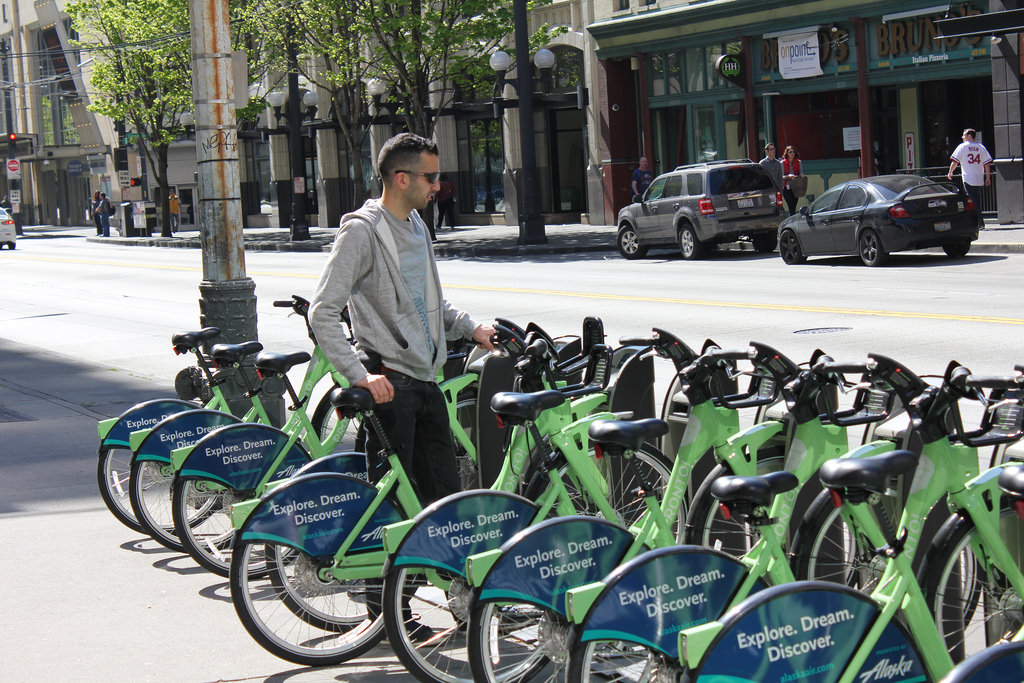If you took one look at Seattle’s municipal bikeshare system five months ago, you would have seen a struggling project on the precipice of being shut down, draining taxpayer’s money.
However, in the past month, thanks to the introduction of three innovative bikeshare companies, there is now fresh life in this ambitious project, with a much brighter future.
Read More: Paparide introduces Canadian collaborative transport platform to US sharing economy
Remarkably, Seattle is now home to the lowest price of any bikeshare system in a major U.S city at just $1 per ride. Moreover, the rainy city is on track to be the proud owner of the US’s largest bikeshare network by the end of the year. Thanks to this new development the city’s government will be receiving more data on these bike trips, allowing authorities to better plan local transportation.
“The city has turned what was an abysmal failure into a huge success story just within a matter of months,” Tom Fucoloro, editor of the Seattle Bike Blog, told CNN. “Seattle is the gateway to the US on bikeshare. A lot of other cities are looking at Seattle and watching.”
Indeed, Seattle has set an incredible precedence, especially when considering that in January a chart was published highlighting the US’s top bikeshare cities, with New York, Chicago and Washington at the top. However, the post also stated that “Seattle’s Pronto will be the first major US bikeshare system to fail when it shuts down in March.”
The expansion and survival of bikesharing systems across the US is an excellent step forward for the country’s transportation systems, citizens and, above all, the environment. This advancement comes at a much needed time, following President Trump’s exit from the Paris Climate Agreement along with his intentions to cut the EPA’s budget by nearly a third, it appears it is up to the startups, businesses and the general public to reduce the USA’s carbon footprint.
Fortunately, our ever-increasing love for the modern sharing economy (SE) might provide a helpful solution by allowing others to utilize our possessions and resources when we are not using them creates a system where we can get more out of less as a society, while both parties benefit.
Read More: Sharing Economy Synchronicity: A Tale of Lifelong Friendships & Unexpected Connections
One of the clearest examples of this is the impact the SE can have on vehicle related air pollution. Startups like Lyft and Uber now make it possible for individuals to frequently use cars at an affordable cost without ever having to personally own one. Moreover, companies with a focus on carpooling, like Commutewise, Paparide, and Zimride, encourage groups of people who are heading in the same direction to share a car.
“Our mission is to reduce the number of vehicles on the road through a more sustainable, socially-inclusive mobility system – one that is accessible to all, and offers a real opportunity for users to generate extra income,” said Paparide Network CEO and Co-Founder Ayoub Moutiya.
Not only is the SE having a dramatic impact on how we get from A to B, but it is also changing what we do when we get to B. The SE has also given birth to on demand parking apps like ParqEx which help to reduce automobile emissions by reducing the amount of time we spend searching for parking spaces in crowded cities. On top of this, we are able to make the most of spaces that already exists instead of paving over land to make room for more parking lots.
While these may not be the best of time for environmentalists, modern technology may be able to help in an indirect way while benefiting communities and everyone involved. As startups continue to use the SE in increasingly novel ways, we are more likely to see resources shared and used through more efficient and economical processes.












